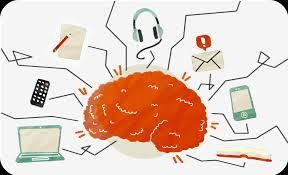Anxiety
Is Too Much Juggling Causing You Brain Drain?
Multi-tasking non-stop? Anxious when separated from smart device?
Posted February 26, 2014

I am writing this as much for myself as you, to remember to give my brain time outs from multi-tasking and smart gadgets.
Between the pressure to get more things in a day done then we are sometimes capable of and the easy access to smart tools, we switch our brain frantically between tasks which causes an overload of the brain’s processing capacity and we burn out.
Professor Earl Miller, a neuroscientist at the world-renowned Massachusetts Institute of Technology scanned volunteers’ heads while they performed different tasks and found that when there is a group of visual stimulants in front of you, only one or two things tend to activate your brain, indicating we’re really only focusing on one or two items.
In other words, our brains try to perform similar tasks at the same time such as balancing our checkbook and talking on the phone and they compete to use the same part of the brain. As a result, your brain simply slows down.
Not only does multi-tasking burn us out, but research is showing that switching between tasks also makes us less efficient.
An American study reported in the Journal Of Experimental Psychology found that it took students far longer to solve complicated math problems when they had to switch to other tasks. In fact, they were up to 40 per cent slower.
The same study also found multitasking has a negative physical effect, prompting the release of stress hormones and adrenaline.
This can trigger a cycle, where we work hard at multi-tasking, take longer to get things done, then feel stressed, and are compelled to multi-task even more.
Stress is a part of life but we can only take so much of it, so staying aware of the how much multi tasking without pauses adds to stress is something I am more cognizant of and recommend highly.
Taking at least two pauses daily to reboot my brain and body is a minimum requirement now, plus an hour to exercise as well. I also suggest taking breathing breaks regularly and originating the breath from as low down in your diaphragm as possible as it will activate your parasympathetic nervous system and relax you.
The other thing to watch out for is stress caused by separation anxiety.
I worked with an executive who had horrific anxiety attacks while in the shower in the AM. Sounds funny? It’s not. His fear of missing out on some transaction or an email from his manager caused him to stress big time when his cell phone was not in his hand. Sound familiar?
According to Tech Norms for Travelers, a survey by chip-maker Intel found that nearly half of all American travelers feel anxiety if they don’t have their devices with them. Also, three-fourths of young adults compromise comfort and hygiene to find an electric outlet.
Nearly 80% of respondents said losing their precious device would be more stressful than misplacing a wedding ring.
Of course we find ourselves more empowered and connected by technology than ever before, but as a result, many of us experience the same anxiety you would feel when being away from a loved one.
And then there’s social media.
Crazy huh? It's not being on social networks that makes people anxious, as much as it's being away from them.
I’ve seen kids turn down the beach to stay in the van and play hand held computer games instead and even had a friend visit me on Maui who dropped her electronic game box in the ocean. (I know you are probably asking, why she carried it with her to the sands edge.) As she put it, her “gamey” is with her at all times and she refused to get into the ocean or enjoy a nice mango drink, until we went to Radio Shack and got her a replacement.




